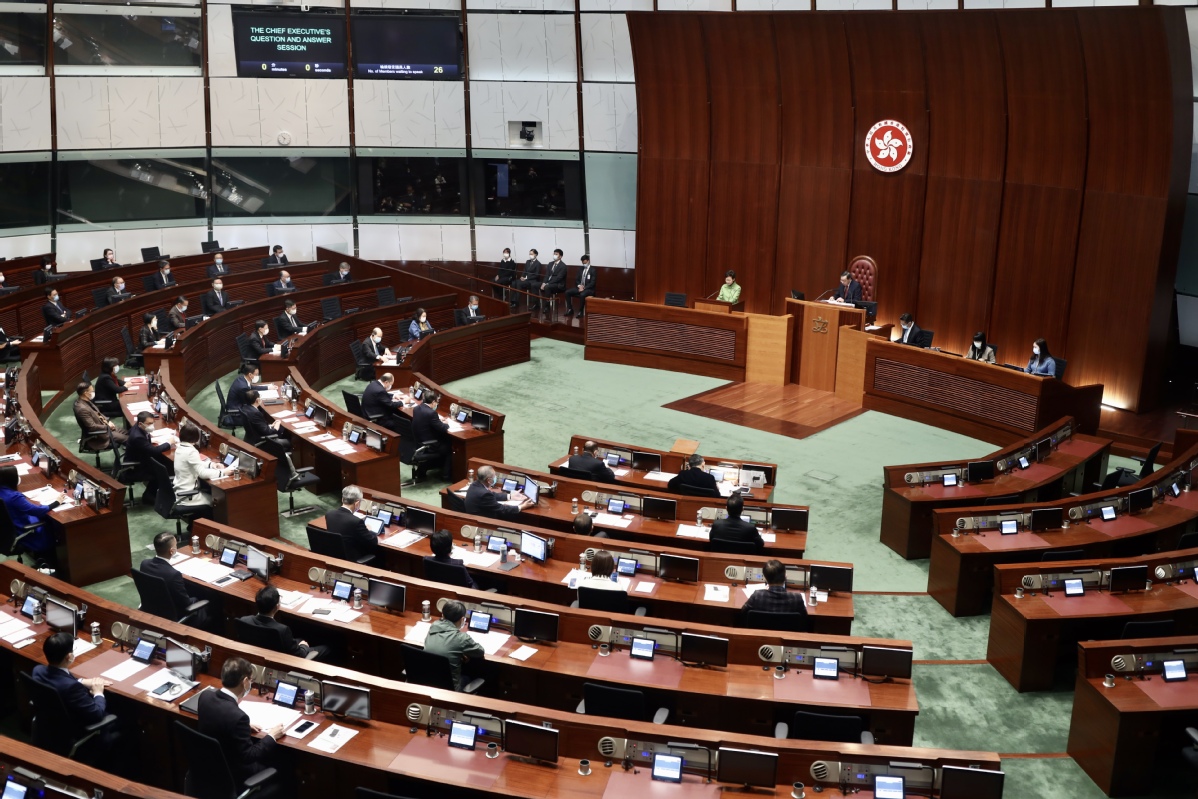HK back on its feet after protests, epidemic


Legal moves have helped investment and a sense of calm return to the city. Li Bingcun reports from Hong Kong.
Last year marked a turning point for Hong Kong. After the traumatic protests in 2019, society healed the wounds while battling a crippling epidemic, seeing positive signs of change on the streets, on campuses, and in people's vision for the future.
The changes have been sustained by the Hong Kong people's resilience in times of hardship, together with timely support from the central government, which took decisive action to steer the city on the right course.
Following a series of initiatives last year to restore law and order in the Hong Kong Special Administrative Region, the National People's Congress-the nation's top legislature-h(huán)as now taken a further step to safeguard the city's long-term stability and prosperity by drawing up a draft decision on improving its electoral system to ensure patriots govern Hong Kong.
According to the draft, which was submitted to the fourth annual session of the 13th National People's Congress on Friday for deliberation, the improvement will be centered around the reformation and greater empowerment of Hong Kong's Election Committee, which elects its chief executive.
In a speech explaining the decision, Wang Chen, a vice-chairman of the NPC Standing Committee, said it was designed to remove Hong Kong's existing institutional deficiencies and form a new democratic electoral system suited to the city's realities and characteristics.
The NPC Standing Committee enacted the National Security Law for Hong Kong on June 30 to plug long-standing loopholes by proscribing four offenses: secession; subversion; terrorist activity; and collusion with external forces to endanger national security.
In October, the NPC Standing Committee laid out explicit requirements for aspiring lawmakers to uphold Hong Kong's Basic Law and honor their pledge of allegiance to the special administrative region.
In light of the changes, Hong Kong Chief Executive Carrie Lam Cheng Yuet-ngor said 2020 was a new start to the steady implementation of the "one country, two systems" principle. She also said that the support provided had laid a solid foundation for Hong Kong's lasting prosperity and stability, and that her feelings were shared by many Hong Kong people who longed for peace and a return to normality.
Society restores order
After the implementation of the National Security Law, a Hong Kong resident surnamed Wan said she felt much more assured and comfortable in her daily life, given the drop in protest violence that plagued the city for about a year beginning in June 2019.
During the unrest, which was sparked by the government's move to amend extradition laws, black-clad protesters wreaked havoc in the city through fierce attacks on police officers, extensive damage to public facilities, assaults and threats to passersby who expressed different political views, and vandalizing stores with links to the Chinese mainland.
Wan said she can now dress in whatever colors she likes, go to shops regardless of their links to the mainland, and express her opinions without fear. She even dares to erase anti-government slogans on the streets, unafraid of reprisals from protesters.
"The voice of justice has taken the upper hand and radical forces have lost their momentum... this is what a civilized society should be," she said. "I'm really happy that everything has returned to normal."
Renato, an Italian-born Hong Kong resident who has lived in the city for two decades, said he considered moving to Shenzhen, Guangdong province, with his wife and son at the height of the unrest. Although they didn't follow through with the idea, the fear and panic they experienced at that time still affected their peaceful existence in Hong Kong.
Feeling outraged by the rioters' destruction of the city, he welcomed the arrival of the security law, which has effectively safeguarded his second home. Pleased to see that the city has moved back on the right course, he has also regained confidence in its future.
Deterred by the law, some political groups advocating "Hong Kong independence" disbanded, and some activists fled the city. As of Feb 1, 97 people had been arrested on suspicion of violating the National Security Law, including high-profile figures Jimmy Lai Chee-ying and Joshua Wong Chi-fung. Eight of the suspects have been prosecuted.
Citing these developments, Hong Kong Secretary for Security John Lee Ka-chiu told a United Nations web conference on March 1 that the effect of the National Security Law is "obvious and direct". He added that, contrary to misperceptions, Hong Kong residents continue to enjoy legitimate rights and freedoms enshrined in the Basic Law, and have extra protection from national security threats.
- Spring Festival travel expected to reach record high
- C919 begins Shanghai-HK regular flight
- Mount Qomolangma's foreign tourist number doubles in 2024
- Yuyuan Garden lights up with Year of the Snake lantern installations
- New dendrobium orchid species found in Sichuan
- People welcome the New Year across China





































